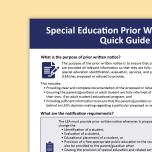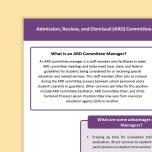ARD Supports

In Texas, the admission, review, and dismissal (ARD) committee is responsible for making decisions about a child’s special education program. The ARD committee is also known as the individualized education program (IEP) team in other states.
After the initial evaluation report is complete, an ARD committee must meet to review the evaluation and determine if the child meets eligibility criteria for special education and related services.
Notice of Procedural Safeguards
The Notice of Procedural Safeguards explains the rights and responsibilities of parents under the Individuals with Disabilities Education Act (IDEA). Parents must be provided this document once a year and with the following circumstances:
- Upon initial referral or on request for evaluation;
- Upon the first occurrence of the filing of a due process hearing complaint or special education complaint during a school year;
- Upon a disciplinary change of placement; or
- Upon a request by a parent.
The local education agencies (LEAs) must maintain documentation of provision of this document to parents in the child’s eligibility folder.

State Guidance
Notice of Procedural Safeguards
Prior Written Notice
A prior written notice of the meeting must be given to parents when:
- Initiating or changing the educational program or placement of the child
- Or when refusing to initiate or change the educational program or placement of the child
Prior Written Notice must be given at least five school days in advance of the actions that the school proposes or refuses to take, unless a shorter time period is agreed upon. [34 CFR §303.503 – Prior notice by the public agency

ARD/IEP Supports, Evaluation
Prior Written Notice Quick Guide
ARD Committee
The admission, review, and dismissal (ARD) committee is the team that meets to determine eligibility based on a full and individual evaluation report, and to develop an individualized education program (IEP) for the child, if applicable.
The ARD committee members must include the following:
- the parent;
- at least one regular education teacher of the child who must, when possible, be a teacher who is responsible for implementing a portion of the child’s IEP;
- at least one special education teacher or provider of the child;
- a representative of the school;
- a person who can interpret the instructional implications of the evaluation results;
- whenever appropriate, the child;
Additional members may include:
- other individuals who have knowledge or special expertise regarding the child and are invited by either the parent or the school;
- to the extent appropriate, with parent’s written consent or, after the child reaches age 18, with the adult child’s written consent, a representative of any participating agency that is likely to be responsible for providing or paying for transition services;
- a representative from career and technical education, preferably the teacher, if the child is being considered for initial or continued placement in career or technical education; and
- a professional staff member who is on the language proficiency assessment committee (LPAC), if the child is identified as an English language learner.
- Other Teachers:
- a teacher who is certified in the education of students with auditory impairments, if the child has a suspected or documented auditory impairment;
- a teacher who is certified in the education of students with visual impairments, if the child has a suspected or documented visual impairment; or
- a teacher who is certified in the education of students with visual impairments and a teacher who is certified in the education of students with auditory impairments, if the child has suspected or documented deaf-blindness.
ARD Committee Manager
An ARD committee manager is a staff member who facilitates or leads ARD committee meetings and helps meet local, state, and federal guidelines for students being considered for or receiving special education and related services. This staff member often acts as a liaison during the ARD committee process between school personnel and a student’s parents or guardians. Other common job titles for this position include ARD Committee Facilitator, ARD Committee Chair, and ChildCentered Process Liaison. Position titles may vary from one local education agency (LEA) to another.
Advantages of utilizing ARD Committee Managers
- Freeing up time for evaluation staff to focus their expertise on evaluation, direct services to students, consultation with staff, and participation on student intervention teams
- Improved Compliance With Federal State Special education requirements and local procedures
- Increased staff support to assist with consistent IEP development and implementation and documentation
- Consistent communicationwithstaffandfamiliesfroma central point of contact
- Streamlined ARD meeting scheduling by a designated point of contact
- Improved consistency in following ARD committee process and procedures
- Technical Support for staff working in the LEA special education data management system
ARD Committee Manager vs IEP Facilitator
The title “ARD Committee Manager” or “ARD Committee Facilitator” should not be confused with the term “facilitated IEP” or “IEP facilitation”. IEP facilitation is a method of alternative dispute resolution that involves the use of a trained facilitator to assist an ARD committee in developing an IEP for a student with a disability. The assigned IEP Facilitator is not a member of the ARD committee and has no decision-making authority over the ARD committee meeting.
Roles and Responsibilities of the ARD Committee Manager
- Scheduling and mailing notices for ARD committee meetings
- Gathering relevant student data, such as, grades, attendance, behavior reports, progress monitoring data, universal screening results, previous and current evaluation reports
- Preparing and finalizing required ARD committee paperwork
- Facilitating the ARD committee meeting
- Sending completed Individualized Education Program (IEP) documents to the parents or guardians and archiving in accordance with LEAprocedures
- Supporting families and school personnel with special education questions
- Assisting classroom teachers with understanding and documenting the receipt of students’ IEP paperwork
- Complying with requirements established by federalandstatelaw,stateboard education (SBOE)rules, local board policies, and special education operating procedures
Resources

ARD/IEP Supports, Child Find
ARD Committee Manager Quick Guide

Child Find, ARD/IEP Supports
ARD Committee Manager Training

Parent's Guide to the ARD Process
Individualized Education Program (IEP)
If a child is eligible for special education services, the admission, review, and dismissal (ARD) committee is required to develop an individualized education program (IEP). [34 CFR §300.320.]
The ARD committee must consider:
- The most recent evaluation
- The strengths of the child
- Parent input
- Academic, developmental, and functional needs of the child
The IEP must contain:
- A statement of present levels of academic achievement and functional performance (PLAAFP)
- A statement of annual goal(s) and how progress toward meeting the annual goal will be measured. For students with disabilities who take alternate assessments, a description of benchmarks or short-term objectives must be included
- A description of special education and related services designed to meet the student’s needs
- A description of the frequency for reporting progress to the parents
- A statement of participation in state and district-wide assessments
- A description of opportunities to participate in extracurricular and nonacademic activities or justification for nonparticipation
- A description of the instructional setting and lengths of the student’s school day
- A written statement of the IEP must document the decisions of the ARD committee with respect to issues discussed at each ARD committee meeting. The written statement must also include:
- (1) the date of the meeting;
- (2) the name, position, and signature of each member participating in the meeting; and
- (3) an indication of whether the child's parents, the adult student, if applicable and the administrator agreed or disagreed with the decisions of the ARD committee.
- Completion of the supplement for transition services (beginning for a student not later than when the student reaches 14 years of age)
- Documentation of information provided to the parents and student regarding the transfer of rights at age of majority
- Completion of supplements for additional areas that are addressed for children with certain disabilities or needs:
- Student who is blind or visually impaired
- Transportation
- Extended school year
- Autism (Autism Supplement Guidance Document)
- Placement in a residential educational placement
- Placement at the Texas School for the Blind and Visually Impaired (TSBI) or the Texas School for the Deaf
- Behavior intervention plan
The Texas Education Agency (TEA) has developed a model individualized education program form. The form contains only the required components of an IEP set out in the IDEA and all state-imposed requirements relevant to an individualized education program not required under federal law. (see TEC 29.0051)
LPAC/ARD Collaboration
When a student with a disability is, or might be identified as an Emergent Bilingual (EB) the student's admission, review, and dismissal (ARD) committee must work in conjunction with the language proficiency assessment committee (LPAC) to determine appropriate entry and exit criteria for bilingual education or English as a Second Language (ESL) program. (19 TAC §§89.1226(h), (l), and (m)).
Identifying a Student as an Emergent Bilingual/English Learner
The LPAC in conjunction with the ARD committee will identify a student as an emergent bilingual if the student’s ability in English is so limited or the student’s disabilities are so severe that the English language proficiency assessment described in 19 TAC §89.1226(c) cannot be administered. Local education agencies (LEAs) shall implement assessment procedures that differentiate between language proficiency and disabling conditions in accordance with 19 TAC Subchapter AA (relating to Commissioner’s Rules Concerning Special Education Services) and shall establish placement procedures that ensure that placement in a bilingual education or ESL program is not refused solely because the student has a disability. Access to special education and bilingual or ESL services may not be restricted or denied due to limited staffing, scheduling, or other reasons of administrative convenience
Reclassifying an Emergent Bilingual/English Learner as English Proficient
Under 19 TAC §89.1226 (i), districts are required to use the current year’s Emergent Bilingual/English Learner Reclassification Criteria Chart located on the TEA Bilingual/ESL Programs webpage to reclassify emergent bilingual students as English proficient at the end of the school year.
This standardized process for reclassification applies to the majority of emergent bilingual students who are also eligible for special education services.
The standard reclassification criteria include three components:
- English Language Proficiency Assessment
- State Standardized Reading Assessment
- Subjective Teacher Evaluation, using the Emergent Bilingual/English Learner Reclassification Rubric
The annual review of student progress and decision to reclassify must be conducted through coordination of the LPAC and ARD committee.
For more information regarding services for Emergent Bilingual students, visit the TEA Bilingual and ESL Programs webpage.
